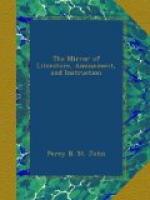—How appropriate is the story and its sequel; nay, almost as good as two of Mr. Farley’s pantomime scenes at Christmas. “The Miller’s Daughter,” a tale of the French Revolution, which follows, is hardly so fit: even the mention of Robespierre and the Reign of Terror chills one’s blood. “The Sights of London,” is a string of “City Scenes” in verse; and “May Maxwell,” and “The Broken Pitcher,” are pretty ballads, by the Howitts. We are not half through the book, and can only mention “the Young Governess,” a school story—“the Birds and the Beggar of Bagdad,” a fairy tale—“Lady Lucy’s Petition,” an historiette—“the Restless Boy,” by Mrs. Opie, and the “Passionate Little Girl,” by Mrs. Hofland—all sparkling trifles in prose. Among the poetry is “the African Mier-Vark,” or Ant-eater, by Mr. Pringle, and “the Deadly Nightshade,” a sweetly touching ballad, dated from Florence; “the Vulture of the Alps” is of similar character; and we are much pleased with some lines on Birds, by Barry Cornwall, one set of which we copy, the best prose papers being too long for extract:
TO A WOUNDED SINGING BIRD.
Poor singer! hath the fowler’s gun,
Or the sharp winter, done
thee harm?
We’ll lay thee gently in the sun,
And breathe on thee, and keep
thee warm;
Perhaps some human kindness still
May make amends for human ill.
We’ll take thee in, and nurse thee
well,
And save thee from the winter
wild,
Till summer fall on field and fell,
And thou shalt be our feathered
child,
And tell us all thy pain and wrong
When thou again canst speak in song.
Fear not, nor tremble, little bird,—
We’ll use thee kindly
now,
And sure there’s in a friendly word
An accent even thou
shouldst know;
For kindness which the heart doth teach,
Disdaineth all peculiar speech.
’Tis common to the bird, and brute,
To fallen man, to angel bright,
And sweeter ’tis than lonely lute
Heard in the air at night—
Divine and universal toungue,
Whether by bird or spirit sung!
But hark! is that a sound we hear
Come chirping from its throat,—
Faint—short—but
weak, and very clear,
And like a little grateful
note?
Another? ha—look where it lies,
It shivers—gasps—is
still,—it dies!
’Tis dead,—’tis
dead! and all our care
Is useless. Now, in vain
The mother’s woe doth pierce the
air,
Calling her nestling bird
again!
All’s vain:—the singer’s
heart is cold,
Its eye is dim,—its fortune
told!
A versification of a story in Mrs. Barbauld’s “Evenings at home,” by Sneyd Edgeworth, Esq. deserves favourable mention; even the names will tempt the reader.
There are eleven plates; the frontispiece, “Little Flora,” from Boaden, and engraved by Edwards, is a sweet production; and the figures in “the Broken Pitcher,” from Gainsborough,[A] are well executed by H. Robinson. To conclude, we cordially recommend this little volume to such purchasers as wish to combine simplicity with talent, and the several beauties of picture and print in their “New Year’s Gift,” for 1830.




